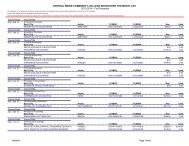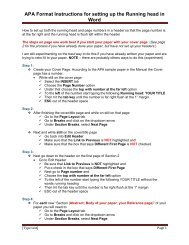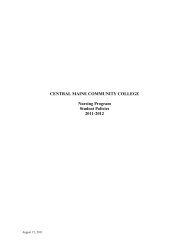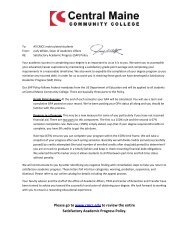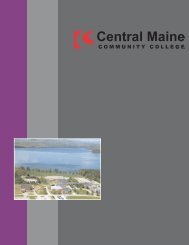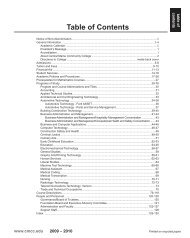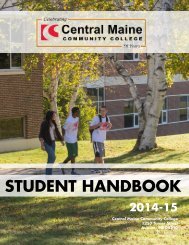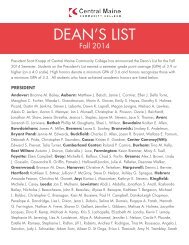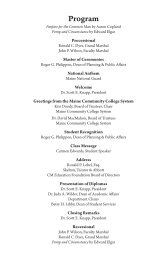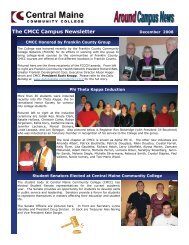Academic Policies and Procedures - Central Maine Community ...
Academic Policies and Procedures - Central Maine Community ...
Academic Policies and Procedures - Central Maine Community ...
You also want an ePaper? Increase the reach of your titles
YUMPU automatically turns print PDFs into web optimized ePapers that Google loves.
Course Descriptions<br />
course<br />
descriptions<br />
SOC 296 Special Topics in Sociology<br />
3 Credits (3 Lecture 0 Lab 0 Shop)<br />
3 Hrs/Wk (3 Hrs. Lecture) *15 wks<br />
The students in this course will analyze selected<br />
topics in sociology. These topics will analyze various<br />
social patterns in con temporary society. The<br />
special topic ana lyzed is not a regular course offering<br />
of the social sciences department. Since<br />
the topic covered in this class differs from year<br />
to year, students should seek further informa tion<br />
from the instructor before registering regarding<br />
the particular topic that will be analyzed. Possible<br />
areas to be analyzed include: family <strong>and</strong><br />
life course, research methods, social change <strong>and</strong><br />
development, social deviance <strong>and</strong> mental health,<br />
social organization, social psychology, social<br />
inequality, <strong>and</strong> general. Possible topics to be addressed<br />
include: gender roles, race <strong>and</strong> ethnic<br />
relations, aging, deviance <strong>and</strong> criminology.<br />
Spanish (SPA)<br />
SPA 101 Beginning Spanish I<br />
3 Credits (3 Lecture 0 Lab 0 Shop)<br />
3 Hrs/Wk (3 Hrs. Lecture) *15 wks<br />
An introductory course in Spanish with emphasis<br />
on development of listening comprehension,<br />
speaking, reading <strong>and</strong> writing skills. For students<br />
who have had no Spanish or one year of<br />
high school Spanish.<br />
SPA 102 Beginning Spanish II<br />
3 Credits (3 Lecture 0 Lab 0 Shop)<br />
3 Hrs/Wk (3 Hrs. Lecture) *15 wks<br />
Continuation of Spanish 101. Emphasis on development<br />
of listening comprehension, speaking,<br />
reading <strong>and</strong> writing skills. Pre requisite:<br />
Spanish 101 or 2 years of high school Spanish.<br />
Telecommunications<br />
Technology (TET)<br />
TET 201 Telecommunications I<br />
3 Credits (2 Lecture 1 Lab 0 Shop)<br />
4 Hrs/Wk (2 Hrs. Lecture 2 Hrs. Lab) *15 wks<br />
This course will ensure that the student can recognize,<br />
construct, analyze, trou bleshoot, repair<br />
<strong>and</strong> modify data telecom munications equipment<br />
<strong>and</strong> circuitry. The course starts with the basics<br />
of micro processors then proceeds to terminals,<br />
computer IO, data transmission <strong>and</strong> modems<br />
analyzing how electronics circuits accomplish<br />
these tasks. The course then continues with<br />
the study of ethernet LANs, the OSI reference<br />
model, the internet <strong>and</strong> TCP/IP. Prerequisite:<br />
ELT 153; Co-requisite: ELT 145.<br />
Telecommunications<br />
Technology - FairPoint (TTF)<br />
TTF 114 Electrical Circuits<br />
4 Credits (4 Lecture 0 Lab 0 Shop)<br />
4 Hrs/Wk (4 Hrs. Lecture) *15 wks<br />
In this course students learn to analyze DC <strong>and</strong><br />
AC passive circuits using Ohm’s Law, Kirchhoff’s<br />
Laws, Thevenin’s <strong>and</strong> Norton’s Theorem,<br />
<strong>and</strong> Superposition. RC <strong>and</strong> RL circuits are<br />
analyzed for impedance <strong>and</strong> res onance. Transformers<br />
are used in step-up <strong>and</strong> step-down<br />
configurations. Trou bleshooting <strong>and</strong> analysis by<br />
computer simu lation using MultiSim is stressed<br />
throughout. Prerequisites: BCA 120 <strong>and</strong> MAT<br />
130.<br />
TTF 143 Electronics I<br />
4 Credits (4 Lecture 0 Lab 0 Shop) 4 Hrs/Wk (4<br />
Hrs. Lecture) *15 wks<br />
In this course students are trained in the characteristics<br />
of diodes, transformers, <strong>and</strong> rectifier<br />
circuits including filtering. Amplifiers using BJTs<br />
<strong>and</strong> FETs are analyzed with respect to Amplification,<br />
dB, <strong>and</strong> input <strong>and</strong> output impedance. Power<br />
amps are intro duced with emphasis on the<br />
complementary-symmetry class B circuit. The<br />
frequency response of passive networks <strong>and</strong><br />
amplifiers is measured. Operational amplifiers<br />
are introduced to build inverting, non-inverting,<br />
<strong>and</strong> specialty amplifiers. Troubleshooting <strong>and</strong><br />
analysis by computer simulation using MultiSim<br />
is stressed throughout. Prerequi site: TTF 114.<br />
TTF 151 Digital I<br />
4 Credits (4 Lecture 0 Lab 0 Shop)<br />
4 Hrs/Wk (4 Hrs. Lecture) *15 wks<br />
This course will prepare students to under st<strong>and</strong>,<br />
test, troubleshoot, <strong>and</strong> repair digital electronics<br />
circuits as well as work in an engineering environment<br />
in a technical capacity. Abstract topics<br />
such as systems <strong>and</strong> codes, logic, functions,<br />
<strong>and</strong> Boolean algebra will serve as a basis for<br />
working with applications involving digital integrated<br />
circuits. Digital integrated circuits covered<br />
will include logic gates; adders <strong>and</strong> other<br />
arithmetic circuits; flip-flops; shift registers; serial/parallel<br />
converters; counters; com parators;<br />
encoders <strong>and</strong> decoders; <strong>and</strong> ana log to digital<br />
<strong>and</strong> digital to analog conversion. Students will<br />
use equipment such as digital multimeters, oscilloscopes,<br />
signal generators <strong>and</strong> power supplies.<br />
Computer simulation using Electronics<br />
Workbench will also be used to enhance underst<strong>and</strong>ing.<br />
Prerequisites: TTF 240, MAT 230,<br />
<strong>and</strong> PHY 130.<br />
TTF 160 Digital Systems for<br />
Telecommunications I<br />
4 Credits (3 Lecture 1 Lab 0 Shop)<br />
5 Hrs/Wk (3 Hrs. Lecture 2 Hrs. Lab) *15 wks<br />
This course presents topics in hardware <strong>and</strong> systems<br />
as used in the telecommuni cations industry.<br />
Electrical <strong>and</strong> digital cir cuits are explored. Binary<br />
numbers systems are discussed as applied to<br />
telecommunications equipment. Students will<br />
explore hardware to the modular level. Students<br />
will demonstrate <strong>and</strong> simulate digital circuits. Prerequisites:<br />
BCA 120 <strong>and</strong> MAT 130.<br />
TTF 161 Digital System for<br />
Telecommunications II<br />
4 Credits (4 Lecture 0 Lab 0 Shop)<br />
4 Hrs/Wk (4 Hrs. Lecture) *15 wks<br />
In this course students will be working with hardware<br />
<strong>and</strong> software installation with an introduction<br />
of the personal computer funda mentals.<br />
Students will connect a personal computer to<br />
a network, <strong>and</strong> install <strong>and</strong> setup a printer. The<br />
course will cover managing <strong>and</strong> supporting<br />
Windows. Configure user related issues <strong>and</strong><br />
customization. Learning how to maintain a computer<br />
<strong>and</strong> trou bleshooting fundamentals. Students<br />
will connect a personal computer to a network,<br />
<strong>and</strong> install <strong>and</strong> setup a printer. An optional<br />
topic would cover Home Technology Integra tion<br />
including surveillance <strong>and</strong> home automation.<br />
The course is composed of lec ture <strong>and</strong> in-class<br />
demonstration. Prerequi site: TTF 160<br />
TTF 162 Electrical Circuits<br />
4 Credits (4 Lecture 0 Lab 0 Shop)<br />
4 Hrs/Wk (4 Hrs. Lecture) *15 wks<br />
In this course students learn to analyze DC <strong>and</strong><br />
AC passive circuits using Ohm’s Law, Kirchhoff’s<br />
laws, Superposition. RC <strong>and</strong> RL circuits<br />
are analyzed for impedance <strong>and</strong> phase angles;<br />
Troubleshooting, analysis by computer simulation<br />
using simulation soft ware, <strong>and</strong> telecommunication<br />
applications are stressed throughout.<br />
Prerequisites: BCA 120 <strong>and</strong> MAT 230.<br />
TTF 240 Electronics II<br />
4 Credits (4 Lecture 0 Lab 0 Shop)<br />
4 Hrs/Wk (4 Hrs. Lecture) *15 wks<br />
Students practice the analysis <strong>and</strong> applica tion<br />
of advanced electronic circuits. Topics include<br />
operational amplifiers, frequency response of<br />
active filters, oscillators <strong>and</strong> high frequency amplifiers,<br />
phase locked loops, amplitude modulation,<br />
frequency modulation, pulse modulation,<br />
www.cmcc.edu 2010 ~ 2011 117



